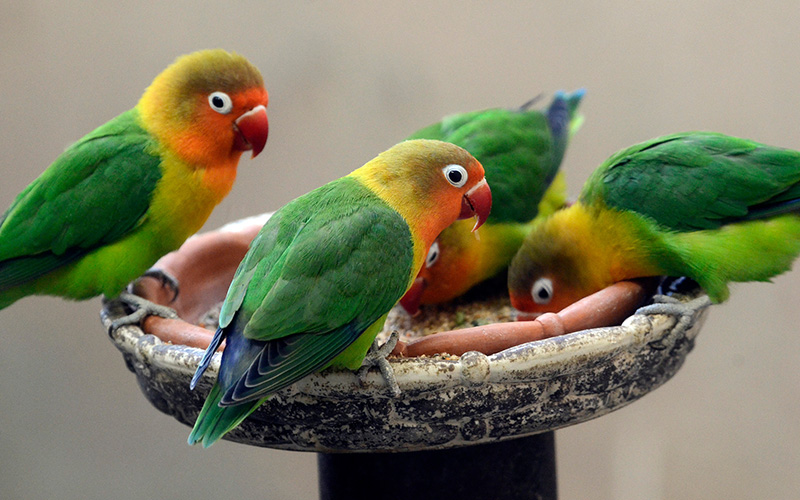Hamsters make lovely additions to any family as they’re adorable, sweet, entertaining, and low-maintenance furry friends! But ensuring a hamster’s health and happiness requires preparation and work. Learning to care for them is crucial if you’re considering getting one.
We’ll review everything you need to learn about caring for these adorable furry creatures. In addition, parents can teach their children to care for hamsters and what to do if they bite through this hamster care guide.
Hamster’s Ideal Environment
When you want to take care of a hamster, it’ll require a lot of room to play and move around. Health issues and a shorter lifespan can result from a small cage.
A rule of thumb is to purchase pens at least 24” by 12” and 12” tall. This measurement will give your hamster enough room to run, climb, and play.
Hamsters are prone to self-inflicted wounds. To prevent injuries, the bottom of the cage should be sturdy, with mesh or wire floors. The enclosure should also have a solid door with a tight latch to prevent your pet from escaping.
In addition to this hamster care guide, remember that toys are essential for hamsters to keep them entertained and stimulated.
These are active creatures that need plenty of exercise. Add hamster toys like running wheels, tunnels, and chew toys to make them happy. A wheel of at least 8” in diameter is ideal for a Syrian hamster. At the same time, a smaller wheel is suitable for a dwarf hamster.
Offer your hamsters a place to hide in. They love having areas where they can retreat and feel secure. A small hideaway, like a plastic igloo or cardboard box, is an excellent option. You can also provide them with items to climb on, like ramps or ladders.
Food and Water Needs

These adorable hamsters are known to be omnivores and need to have a well-balanced diet. You can buy pre-packaged food containing all the necessary nutrients or make your mix!
So, what can hamsters eat? If you create a hamster mix, you may include seeds, grains, nuts, and dried fruit. Fresh fruits and vegetables can also be given in small amounts.
Water should always be available when caring for hamsters. A water bottle that attaches to the side of the cage is the best option. Make sure to clean and refill it daily as well!
Does a Hamster Need a Friend?
Among various tips to care for a hamster, you must consider whether they’ll require a friend to join them.
Although hamsters are social animals, keeping them in the same cage is generally not advised. Due to their territorial nature, hamsters may engage in combat and result in harm or even death.
Keep them in separate cages even if they’re from the same litter. Keeping female hamsters different from male hamsters due to the latter’s propensity for aggression is crucial.
The following hamster care tips will help them get along if you decide to keep more than one of them:
-
Gradually Introduce Them

It’s crucial to introduce them gradually to lessen the likelihood that two hamsters will be hostile to one another. Place them next to each other in separate cages to get used to each other’s scent. Once they’re in the same cell, gradually bring them closer together.
-
Pick the Ideal Pair
The best hamsters to keep are those of the same sex and breed if you intend to keep more than one. It’s best to stay Syrian hamsters alone because they’re particularly prone to fighting. Sometimes, but only when closely supervised, dwarf hamsters can be kept together.
-
Ensure There’s Enough Room
It’s crucial to give hamsters plenty of space, even if they get along well, to avoid territorial disputes. There must be at least 600 square inches in a cage big enough for two hamsters.
-
Have A Lot of Area Resources
To avoid competition and lower stress, offer a variety of hiding spots, feeding areas, and water sources.
-
Observe Any Aggressive Behaviors
Watch for aggressive behaviors like chasing, fighting, or biting. It’s best to separate them immediately to avoid injury if you see any aggressive behaviors.
Involving Kids in Hamster Care

These animals are popular pets for children. Involving kids in caring for hamsters can have several benefits. Not only does it teach responsibility and empathy, but it can also help foster a love for animals and nature.
But take note! It’s also essential to teach kids how to care for hamsters to ensure the animal’s and child’s safety and well-being!
Teaching Kids How to Handle Hamsters with Care
Starting with the basics is vital when teaching kids how to care for hamsters. Here are some critical steps to follow:
- Research: As a parent, it’s highly recommended to research hamster care with your child and learn about their pet’s needs. It can include information on diet, exercise, and habitat.
- Supervision: Kids should always be supervised when caring for their hamsters to ensure safety and proper handling. Adults should be on hand to help with tasks that may be too difficult or dangerous for kids, such as cleaning the cage or trimming nails.
- Feeding: Show your child how to properly feed the hamster, including the appropriate amount and types of food. Be sure to teach them not to overfeed or give them unsafe hamster food, such as chocolate or sugary treats.
- Cleaning: Teach your child how to properly clean the hamster’s cage and accessories, including the bedding, food dishes, and water bottle. Show them how to spot clean daily and deep clean weekly.
- Playtime: It’s essential to teach your child how to properly handle and play with their hamster to prevent injury or stress. Show them how to gently pick up and hold the hamster, encourage them to play with toys, and provide exercise opportunities.
The Advantages of Having Children Help with Hamster Care

Children participating in hamster care can benefit in a variety of other ways aside from teaching them about responsibility and empathy, such as:
- Improved Mental Health: Caring for a pet can help alleviate stress and anxiety and offer companionship and a sense of purpose.
- Possibilities for Learning: Caring for a pet can educate children about biology, animal behavior, and environmental responsibility.
- Strengthen Family Bonds: Taking care of a pet can give families a shared hobby or activity and help families become closer.
Keeping Your Hamster Happy and Healthy
Hamsters are endearing, entertaining, and curious animals that make wonderful pets. You can ensure that your hamster has the time of its life while enjoying the rewards of a healthy and fulfilling lifestyle by adhering to a few basic guidelines and tips.
Here are some tips for keeping your hamster happy and healthy:

- Provide a spacious cage: Hamsters need plenty of room to run, play, and explore. Ensure the cage is large enough to accommodate your hamster’s needs and provide space for toys, hideaways, and exercise equipment. Keep a clean pen daily.
- Offer a varied diet: Hamsters need a balanced diet that includes a variety of fresh fruits and vegetables and a quality hamster food mix. Avoid giving them sugary treats, as these can cause health problems.
- Provide exercise opportunities: Hamsters are active animals and need opportunities to exercise and play. Provide toys and an Exercise wheel or ball to keep your hamster entertained and engaged.
- Handling your hamsters carefully: Regular handling is a good method to help them feel more comfortable with you. The time spent together will also strengthen the bond. So, make sure you’re handling your hamster as gently as possible.
- Monitor their health: Monitor your hamster’s behavior and appearance. If you notice any signs of illness, such as lethargy, loss of appetite, or discharge from the eyes or nose, take them to the veterinarian.
You and your pet can take advantage of many benefits when keeping your hamster happy and healthy like:
- Improved Quality of Life
- Greater Bond with Your Pet
- Decreased Risk of Illness
- Longer Lifespan
What to Do If Your Hamster Bites
Although hamsters are generally friendly, non-aggressive pets, they do have tendencies to bite when they’re either threatened or scared. When your hamster bites you, wash the wound with soap and water and, if necessary, bandage it.
Hamsters having rabies is rare. But if the hamster did bite you or your children, consult a doctor or veterinarian for guidance. Seek medical attention immediately if the bite is severe or you’re experiencing symptoms like fever or swelling.
It’s a Small Animal That Requires Big Responsibility
Caring for hamsters may seem like a small task, but it comes with great responsibility. As pet owners, we must provide our furry friends with the best care and attention.
Remember, hamsters are not just pets. They are family. They rely on us for their well-being and happiness, so providing them with a safe, clean, and stimulating environment is essential.
Your hamster can thrive and become a beloved household member by following the proper care for hamsters and attention tips.
You Can Also Read These:
- How To Avoid Heat Stroke In Dogs Plus Summer Pet Safety Tips
- How To Organize A Pet Parade, It’s Time For Your Pet To Shine
- 15 Best Family Dogs That Are Great With Children




